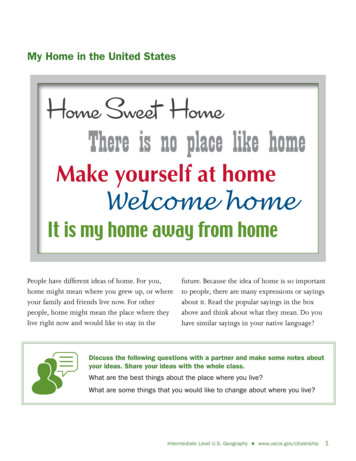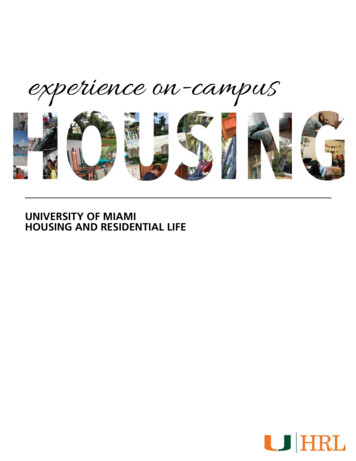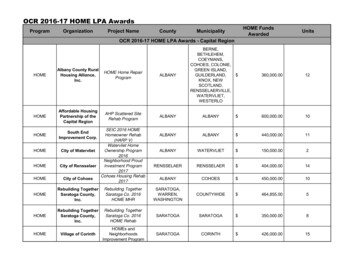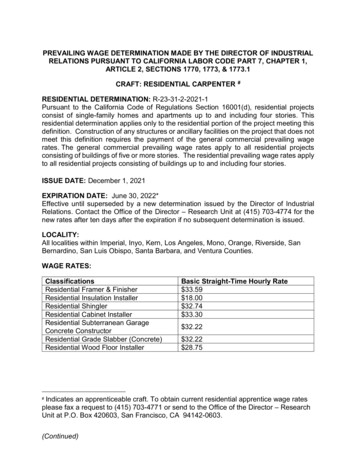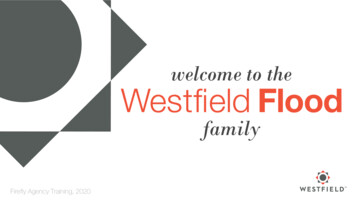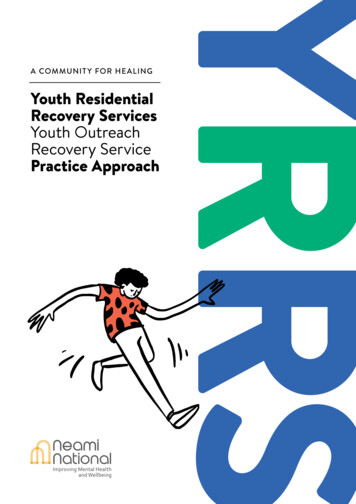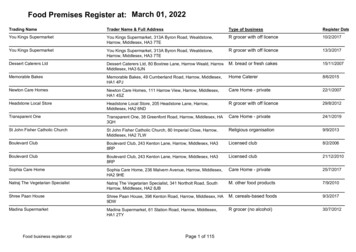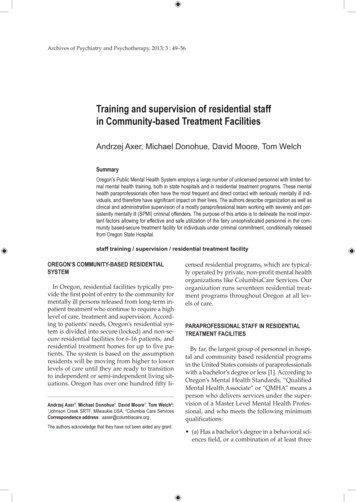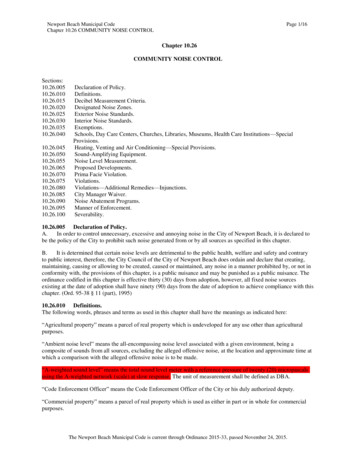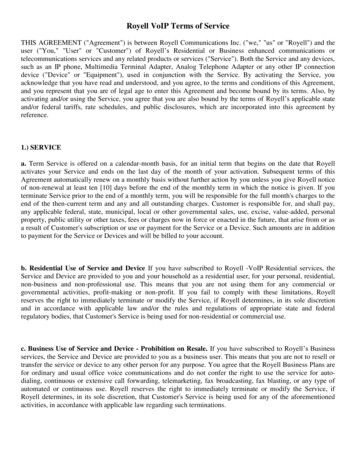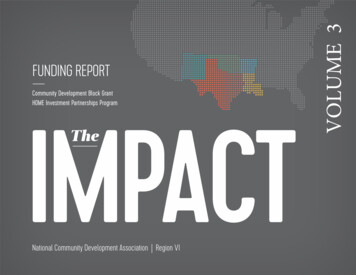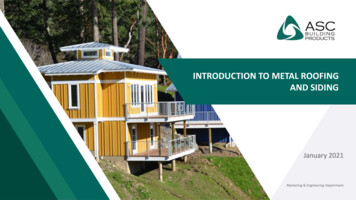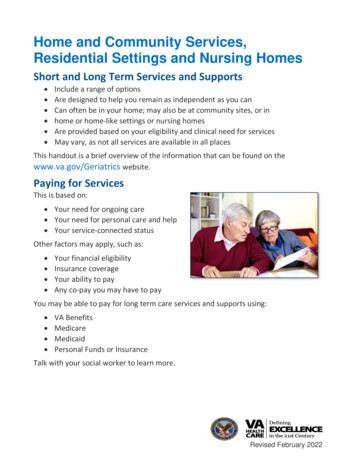
Transcription
Home and Community Services,Residential Settings and Nursing HomesShort and Long Term Services and Supports Include a range of optionsAre designed to help you remain as independent as you canCan often be in your home; may also be at community sites, or inhome or home-like settings or nursing homesAre provided based on your eligibility and clinical need for servicesMay vary, as not all services are available in all placesThis handout is a brief overview of the information that can be found on thewww.va.gov/Geriatrics website.Paying for ServicesThis is based on: Your need for ongoing care Your need for personal care and help Your service-connected statusOther factors may apply, such as: Your financial eligibilityInsurance coverageYour ability to payAny co-pay you may have to payYou may be able to pay for long term care services and supports using: VA BenefitsMedicareMedicaidPersonal Funds or InsuranceTalk with your social worker to learn more.Revised February 2022
Making Decisions and Advance Care PlanningVA offers a Veteran Decision Aid for Care at Home and in the Community as well as aCaregiver Self-Assessment, which you can get from a social worker or download fromwww.va.gov/Geriatrics, to help you think about your needs and what matters toyou.They also help you involve others in making decisions, such as your spouse, familymember, doctor, social worker or other health care team members.The advance care planning process is where you think about your values and wishes foryour health care at a future time if you are no longer able to make choices for yourself.Once you decide what you want, it involves filling out paperwork. The VA advancedirective form is honored in all states. Ask your VA social worker for the form.Whole HealthWhole Health is V!’s cutting-edge approach to carethat supports your health and well-being. WholeHealth centers around what matters to you, not whatis the matter with you. This means your health teamwill get to know you as a person, before working withyou to develop a personalized health plan based onyour values, needs, and goals.Caregiver SupportVA provides many options to support caregivers intheir efforts to care for Veterans and themselves.Learn more at www.caregiver.va.gov. Caregiver Support Line – Call 855-260-3274(toll-free) to talk with trained and licensedstaff who can listen or connect you withlocal support, such as the Caregiver SupportCoordinator at your VA Medical Center Monthly phone education groups – where caregivers can ask questions and getself-care tips Free online workshop – Building Better Caregivers, that helps build the skill andconfidence to care for a Veteran at homeRevised February 2022
Standard Medical BenefitsIf you are enrolled in VHA, and have clinical need, you are eligible for StandardMedical Benefits. This includes: Geriatric Evaluations Care through a GeriPACT Most of the services listed under Home and Community ServicesGeriatric EvaluationGeriatric evaluation is most often done during yourprimary care visit. It is done by a team of experts andincludes a treatment plan. It is available to all enrolledVeterans who need it and is designed to help reducethe need for hospital and long term care services. Whatyou learn during this visit can help you decide whichservices may work best for you.GeriPACTGeriPACT (Geriatric Patient Aligned Care Team) is a specialprimary care team for older and chronically ill Veterans.During your visits, GeriPACT providers work with you andfamily caregivers on things that may impact your health,independence or quality of life.Home and Community ServicesThis type of care supports your independence to stay in your own home as long as youcan. If eligible, you may receive more than one service at the same time.Adult Day Health Care is a program that you can go to during the day for: Social activitiesPeer supportRecreationYou may receive care from nurses, therapists, social workers,and other health care staff.When you go to Adult Day Health Care it provides a break for your family caregiver. Itcan also help you and your caregiver gain skills to manage your care at home. It may beprovided at VA Medical Centers, at community sites and in some State Veterans Home.Revised February 2022
Home Based Primary Care is for Veterans who have complex health care needsand for whom clinic based care does not work well to manage those needs. A VAdoctor supervises a health care team, which provides primary care visits in your homefrom staff such as a: NurseSocial workerRehabilitation therapistDietitianPharmacistMental Health staff, if neededHomemaker and Home Health Aide services are provided by a trainedperson (not a nurse or RN). This person works for anorganization that has an agreement with VA. They aresupervised by a registered nurse.The main focus of a Home Health Aide is to help with handson care, such as bathing, using the bathroom, eating andgetting dressed. During this visit, light homemaker services may be done, such aswashing the Veteran’s clothes or bedding or making a small meal.Hospice Care can provide comfort to you and your family ifyou have a terminal condition, with 6 months or less to live,and are no longer seeking treatment other than palliative care.Hospice Care can be provided at home, or in an inpatientsetting.Palliative Care offers comfort measures that focuson relief of suffering and control of symptoms so thatyou can carry out day-to-day activities and do whatmatters to you – like going to see your grandchildren.The focus of Palliative Care is to improve your qualityof life – in your mind, body and spirit.It can be combined with your treatment. And, it can be started at any time, and maybe provided throughout the course of the illness.Revised February 2022
Respite Care is temporary care given to you toprovide a break for your family caregiver.A trained person can provide Respite Care in yourhome, in an inpatient or community setting or a mix ofthese settings.It may be provided during the day or overnight. RespiteCare can help lower the stress you and your familycaregiver may feel when managing your long term care needs at home.Skilled Home Health Care is short-termhealth care services if you are homebound or live faraway from VA. Care is delivered in your home, mostoften by nurses or physical therapists. The service isprovided by staff from a home health agency thathas an agreement with VA. Examples of servicesinclude wound care for pressure sores, medicationmanagement or injections.Remote Monitoring Care is a service that allows adoctor or nurse to monitor your medical condition, such asyour blood pressure, using home monitoring equipment.A care coordinator gets health information throughpersonalized questions answered on special equipment andthen checks with you, if needed. If any of your healthmeasurements do not seem normal, the care coordinator talks with your physician ornurse and then gets back to you with next steps.Veteran-Directed Home Care provides youor your family caregiver with a flexible budget,based on your needs assessment, to be used forlong term care services.It allows you, and your family caregiver, to decidewhat mix of Home and Community Services willbest meet your needs. You may hire personal careaides, such as your own family member orneighbor. And, you may buy items that will help you live independently.Revised February 2022
Program of All-inclusive Care for the Elderly (PACE) is an optionalbenefit under Medicare and Medicaid, but only in some states. It is not part of V!’sStandard Medical Benefits.P!CE is for those who are frail enough to meet their state’s standards for nursinghome care but who want to keep living at home.The program features medical and social services. They can be provided at home or inthe community. For example, meals may be eaten at an Adult Day Health Care center,at home or both. Physical therapy may be provided at a facility or at home.VA Residential SettingsCommunity Residential Care (CRC) is a VAprogram for Veterans who do not need hospital ornursing home care, but cannot live alone because ofmedical or psychiatric conditions, and who have nofamily to provide care.This type of care takes place in Assisted Living facilities,Personal Care Homes, Family Care Homes, Group Living Homes and PsychiatricCommunity Residential Care Homes. This is a private-pay option.In each of the above settings, the CRC program provides round-the-clock supervisedliving along with meals, recreational activities, assistance with activities of daily living,such as getting dressed, and transportation arrangements.A CRC case manager visits you monthly to answer questions or concerns.Medical Foster Homes (MFH) are inprivate homes and can provide an alternative to along-stay nursing home. The MFH caregiverprovides 24-hour supervision and personalassistance.This type of care may be an option for you if yourmedical condition makes it impossible for you tolive alone. Home Based Primary Care, Spinal CordInjury-Home Care and Mental Health Intensive Case Management programs provideadditional services to you in the MFH. This is a private-pay option.Revised February 2022
Non-VA Residential SettingsAdult Family Homes have a trained caregiver onduty 24 hours a day, 7 days a week to help you withactivities such as bathing and getting dressed.You live in a room that is private or shared and you sharecommon spaces with others in the home. This is aprivate-pay option.Assisted Living Facilities are like Adult FamilyHomes except that your room is in a larger building that isnot a private home. This is a private-pay option.Nursing HomesCommunity Living Centers (CLCs or VANursing Homes) provide nursing home levelof care 24 hours a day, 7 days a week, in a settingthat looks as much as it can like a home.You may need CLC services for a brief time or, inrare cases, for the rest of your life. The aim is torestore your highest level of well-being, preventdeclines in health and provide comfort at the end of life. Eligibility for this program isbased on medical need and service-connected status.Community Nursing Homes provide skillednursing care 24 hours a day, 7 days a week near yourhome and family.These non-VA nursing homes are an option in manyplaces where a VA Community Living Center may notbe available. Eligibility for this program is based onmedical need and service-connected status.Revised February 2022
State Veterans Homes provide a mix of nursing home care, domiciliary care oradult day health care. Some State Veterans Homes can provide care for you and yourspouse and other family members.They are in all 50 states and Puerto Rico. For a listof locations, visit www.nasvh.org (NationalAssociation of State Veterans Homes).State Veterans homes are owned, operated andmanaged by state governments, and each statehas its own rules about which Veterans orVeteran’s family members are eligible for services.NotesTo Learn More – Talk with your VA social worker or care manager.Revised February 2022
State Veterans Homes . provide a mix of nursing home care, domiciliary care or adult day health care. Some State Veterans Homes can provide care for you and your spouse and other family members. They are in all 50 states and Puerto Rico. For a list of locations, visit . www.nasvh.org (National Association of State Veterans Homes).
